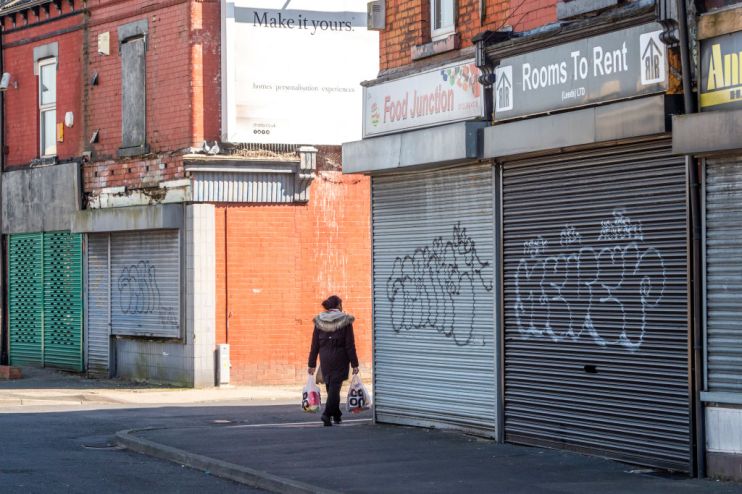Coronavirus: UK economy could shrink by 35 per cent in second quarter

The UK economy could shrink by 35 per cent in the second quarter of this year and unemployment could hit 10 per cent as coronavirus lockdown measures take a devastating toll, Britain’s budget watchdog has warned.
The Office for Budget Responsibility (OBR) said such a slowdown could send the budget deficit to its highest level since World War II as it combines with unprecedented government spending.
A 35 per cent fall in output would be the biggest quarterly contraction on record. That would put the short-term hit of the UK coronavirus outbreak ahead of World War I, World War II, and the financial crisis. And 2m people could lose their jobs, the OBR warned.
Yet the OBR also said it assumes growth would rebound strongly over the medium term, resulting in “no lasting economic hit”.
Under such a scenario, the UK’s public sector net borrowing could hit £271bn, the OBR said. The figure is five times higher than the watchdog’s March forecast and would be the biggest in peacetime.
It would take the deficit to 14 per cent of GDP, the OBR said. This would be well above the peak following the financial crisis.
UK economy in rapid collapse
The dramatic change to the OBR’s forecasts underline just how fast coronavirus has crashed the economy and the speed of government innovation to tackle the fallout.
Chancellor Rishi Sunak only took up the job in February. But already he has unveiled an unprecedented package of UK coronavirus stimulus measures. Among them is a pledge to pay 80 per cent of the wages of workers that would otherwise be laid off. Another measure outlines billions of pounds in grants for small and medium-sized businesses.
These costly coronavirus measures and the collapse in economic output would combine to hammer the UK’s public finances, the OBR warned.
UK borrowing to rocket in coronavirus crisis
The extra borrowing would cause the country’s overall debt to balloon, the OBR warned. It could surpass 100 per cent of GDP this year but end at 95 per cent. This would be well above the 77 per cent expected in March.
The OBR cautioned that it was not making a forecast about the impact of the UK coronavirus crisis. It also said it does not know how long the lockdown will last.
Yet the organisation said its scenario assumed a three-month lockdown followed by another three-month period when measures are partially eased.
The OBR said UK growth could recover relatively quickly from coronavirus. “We have assumed that GDP regains its pre-virus level by the fourth quarter,” it said.
The watchdog said GDP could fall 12.8 per cent in 2020 under its scenario but would then grow 17.9 per cent in 2021. It added: “For now, we assume no lasting economic hit.”
‘Bleak’ outlook for UK economy means we need right policies
The CBI said the OBR’s report was a stark assessment of the impact of coronavirus on the UK economy.
“This makes for bleak reading and stresses the need for the right policies to support our economy through this crisis,” Rain Newton-Smith, CBI chief economist, said.
“The need for coordinated global action to rebuild confidence has rarely been greater. The government will also need to work with businesses and many parts of civil society here at home, to create a plan to revive the economy once the lockdown is lifted.”
Ruth Lea, economic adviser to the Arbuthnot Banking Group, said Thursday’s review of the UK coronavirus lockdown is unlikely to see restrictions eased.
“But, as the evidence mounts concerning the economic and social costs of the measures, debate is inevitably switching to the timing and shape of the government’s exit strategy, with a structured progressive relaxation of the restrictions,” she added.
How quickly can UK recover from coronavirus?
“In the meantime economic activity can only be severely curtailed, damaging businesses and employment prospects and putting pressure on the public finances.”
Ayush Ansal, chief investment officer at Crimson Black Capital, warned that despite the OBR’s bleak scenario of a 35 per cent drop in GDP, this could prove optimistic.
“Markets are increasingly of the view that the impending UK recession is more likely to be L-shaped than V-shaped,” he added.
“The sheer extent of the UK’s current economic displacement could lower its growth trajectory for many years to come.
“If the UK can emerge from the pandemic via a U-shaped recession, in many corners that will be considered a victory of sorts.”
Tax rises likely after UK recovers
Paul Johnson, director of the Institute of Fiscal Studies (IFS) called the figures “staggering”. He added that the economic outlook has worsened dramatically in a matter of months.
“Government borrowing is set to rocket to levels well above those seen during the financial crisis. And debt is set to approach 100 per cent of GDP,” he said.
“These figures are predicated on a short-term economic hit and a swift recovery. Should the lockdown last for longer than three months or the economy fail to bounce back, the picture would worsen further.
“We will need a complete reappraisal of economic policy once the current economic dislocation is behind us. Tough decisions will have to be made which are likely to involve tax rises and higher debt for some time to come. The only other alternative would be another period of austerity on the spending side. That looks unlikely.”